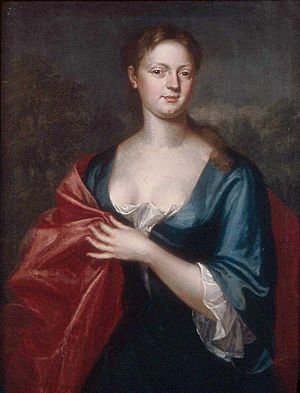Joseph Dudley facts for kids
Quick facts for kids
Joseph Dudley
|
|
|---|---|
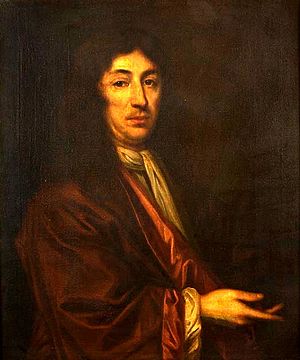
Portrait believed to be of Dudley by Sir Peter Lely
|
|
| President of the Dominion of New England | |
| In office May 25, 1686 – December 20, 1686 |
|
| Preceded by | Simon Bradstreet (as governor of the Massachusetts Bay Colony) |
| Succeeded by | Sir Edmund Andros (as governor of the Dominion of New England) |
| Member of Parliament for Newtown, Isle of Wight |
|
| In office 1701–1702 Serving with Thomas Hopsonn
|
|
| Preceded by | James Worlsey |
| Succeeded by | John Leigh |
| 3rd and 4th Governor of the Province of Massachusetts Bay | |
| In office June 11, 1702 – February 4, 1715 |
|
| Preceded by | Massachusetts Governor's Council (acting) |
| Succeeded by | Massachusetts Governor's Council (acting) |
| In office March 21, 1715 – November 9, 1715 |
|
| Preceded by | Council of Assistants (acting) |
| Succeeded by | William Tailer (acting) |
| Member of the Council of Assistants | |
| In office 1676–1684 |
|
| Personal details | |
| Born | September 23, 1647 Roxbury, Massachusetts Bay Colony |
| Died | 2 April 1720 (aged 72) Roxbury, Province of Massachusetts Bay |
| Spouse |
Rebecca Tyng
(m. 1668) |
| Children | Paul Dudley |
| Parent |
|
| Signature |  |
Joseph Dudley (born September 23, 1647 – died April 2, 1720) was an important leader in the American colonies. He was born in Roxbury, Massachusetts Bay Colony, and his father was one of the colony's founders. Joseph Dudley played a big role in the government of the Dominion of New England from 1686 to 1689. This government was later overthrown in a rebellion known as the 1689 Boston revolt.
After that, he worked briefly in the government of Province of New York. He then spent eight years in England, serving as a leader on the Isle of Wight and even as a member of the English government for a year. In 1702, he came back to New England. He was appointed governor of the Province of Massachusetts Bay and Province of New Hampshire, holding these jobs until 1715.
His time as governor of Massachusetts was often filled with disagreements. His political enemies didn't like his efforts to get a steady salary from the colony. They often complained about his actions. Much of his time as governor was during the French and Indian Wars. Massachusetts and New Hampshire were on the front lines, facing many attacks from the French and their Native American allies. Dudley tried to capture the French city of Port Royal in 1707, but he failed. He then helped gather local army groups for a successful capture of Port Royal in 1710. He also led a failed mission against Quebec in 1711.
Dudley's time as governor started a period of dislike for the king's rule in Massachusetts. The local government often challenged the governor's special powers, especially over how much the king's officials should be paid. This tension continued with most governors of Massachusetts until the American Revolutionary War. However, Dudley's rule in New Hampshire was much smoother and didn't cause many problems.
Contents
Early Life and Education
Joseph Dudley was born in Roxbury, Massachusetts Bay Colony, on September 23, 1647. His father, Thomas Dudley, was one of the colony's founders and a leading judge. Joseph's father was 70 when he was born and passed away in 1653. After his father's death, Joseph was raised by his mother and stepfather, Reverend John Allin, in Dedham, Massachusetts.
Joseph Dudley went to Harvard College and graduated in 1665. By 1672, he became a "freeman," which meant he had the right to vote and hold office. In 1673, he became a member of the Massachusetts General Court, representing Roxbury. He was elected to the colony's council of assistants in 1676.
During King Philip's War, which started in 1675, Dudley served as a commissioner. He went with the colonial troops into battle against Native American tribes. He was present at the Great Swamp Fight, where the Narragansett tribe was defeated. For several years, he also worked as a commissioner for the New England Confederation. He went on important diplomatic missions to nearby Native American communities. He also helped negotiate the border between Massachusetts and the Plymouth Colony.
Changes to Colonial Rule
In the 1660s, King Charles II began to look closely at how the Massachusetts colony was governed. By the late 1670s, the colony faced a serious threat from the King. An agent named Edward Randolph was sent to New England in 1676 to collect taxes and enforce trade laws. He reported many problems to the King's advisors in London.
The leaders of the colony were divided on how to respond. Joseph Dudley was part of a group that wanted to agree to the King's demands. This group included his brother-in-law Simon Bradstreet and William Stoughton. Others in the colony did not want the King to interfere at all. The wealthier landowners and merchants, who were in the upper house of the government, usually favored working with the King. The lower house, which represented more people, was against it.
In 1682, Massachusetts sent Dudley and John Richards to London to present their case to the King's advisors. Dudley made a good connection with William Blathwayt, a colonial secretary. This friendship helped Dudley's future career but also made some people in the colony suspicious of him. The King's advisors demanded that the colony's agents be allowed to change the colonial charter, which was like the colony's constitution. The local government refused this demand.
This led to the King demanding that Massachusetts give up its colonial charter. Dudley brought this news back to Boston in late 1683. There was a big debate, and the group against the King's demands won. Leaders of this group, like Reverend Increase Mather, started to see Dudley and others who wanted to cooperate as enemies of the colony. Dudley was even removed from the council of assistants in the 1684 election.
Some people accused Dudley of secretly working in London to get the charter removed so he could advance his own career. He did talk about a new government with Edward Randolph, but this happened after the King had already demanded the charter. Still, his opponents saw this as proof that he was against the colony's interests. Randolph, however, thought Dudley would be a good servant to the King. Rumors began in Boston in late 1684 that Dudley might become governor.
The Massachusetts charter was officially canceled in 1684. The King's advisors began planning to combine the New England colonies into one large province called the Dominion of New England. This plan was still being worked on when King James II became king in 1685. Because there were delays in appointing a governor for the Dominion, Randolph suggested a temporary leader. Dudley was chosen for this role, and he was appointed President of the Council of New England on October 8, 1685. His territory included Massachusetts Bay, Province of New Hampshire, Province of Maine, and the "Narragansett Country." Randolph was given many other important jobs, which gave him a lot of power.
Leading the Council of New England
Randolph arrived in Boston with Dudley's official papers on May 14, 1686. Dudley officially took charge of Massachusetts on May 25. However, his rule did not start well. Many Massachusetts leaders who were named to his council refused to serve. He also couldn't make peace with Increase Mather, who wouldn't even meet with him. According to Randolph, the Puritan leaders believed "God would never suffer me to land again in this country." Many local military officers also refused to serve.
Dudley appointed new judges, usually choosing those who had supported working with the King. He renewed peace agreements with Native American tribes in northern New England. In June, he traveled to the Narragansett Country to officially establish his authority there.
Dudley faced big problems because he couldn't raise money for the Dominion. His appointment didn't give him the power to create new tax laws. The Massachusetts government had canceled all old tax laws in 1683, expecting to lose their charter. Also, many people refused to pay existing taxes, saying they were made by the old government and were no longer valid.
Dudley and Randolph also tried to introduce the Church of England into New England. However, they were mostly unsuccessful. They didn't have buildings for their new churches. They also knew it would be dangerous to force the local churches to share their buildings.
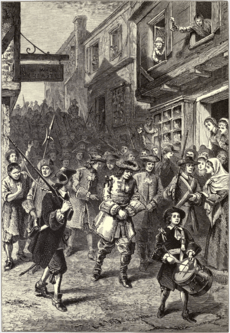
Dudley and Randolph did enforce the Navigation Acts, which controlled trade. However, they sometimes overlooked minor violations because they understood that some parts of the laws were unfair. They suggested to the King's advisors that the laws be changed. Still, their strict enforcement of these acts hurt the Massachusetts economy.
Eventually, Dudley and Randolph had a disagreement over trade, government, and religion. Randolph wrote that Dudley treated him "worse than by Mr. Danforth," comparing Dudley to one of his opponents.
While Dudley was in charge, the King's advisors decided to add Rhode Island and Connecticut to the Dominion. This was based on a request from Dudley's council. The new governor, Sir Edmund Andros, was given instructions to bring Rhode Island and Connecticut under his control.
Working with Governor Andros
Governor Andros arrived in December 1686 and immediately took over. Dudley served on his council and was a judge of the highest court. He also helped control what was printed in newspapers. He was part of a committee that worked to make laws consistent across the entire Dominion. Andros's council was supposed to represent all the combined territories. However, travel was difficult, and the government didn't pay for travel costs. Because of this, his council was mostly made up of people from Boston and Plymouth.
Many people saw Dudley and Randolph as a big part of Andros's harsh rule. Dudley's role as a judge brought him the most criticism. This was especially true when he enforced unpopular laws that Andros put in place, such as new taxes, rules about town meetings, and land ownership.
In April 1689, news arrived about the Glorious Revolution in England. This led to the citizens rising up and arresting Andros. Dudley was away from the city but was arrested when he returned. Because he was sick, he was released to house arrest after paying a large bond. However, a group of people came to his home and took him back to jail. He stayed in jail for ten months, partly for his own safety. Then, by order of King William, he was sent back to England along with Andros and other Dominion leaders. Colonial authorities made accusations against Andros and Dudley. However, their agents in London were not ready to formally present these charges in court. So, the charges were dropped, and both men were freed.
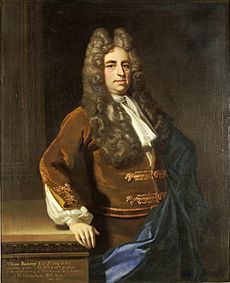
Dudley was stuck in London with few connections. He asked Blathwayt for help. He also asked a business friend, Daniel Coxe, to help him find a new job. Coxe was a landowner in West Jersey and considered Dudley for a leadership role there. Dudley was eventually recommended to be the chief advisor to New York governor Henry Sloughter, a position he started in 1691.
Besides his council duties, Dudley negotiated with Native American tribes in New York. He also served as the chief judge in the trial of Jacob Leisler. Leisler had led a rebellion in 1689 that overthrew Andros's lieutenant governor, Francis Nicholson. The trial was controversial, and Dudley's role made him many enemies. Leisler was found guilty and sentenced to death. Governor Sloughter initially didn't want to execute Leisler and his main ally, Jacob Milborne, right away. He preferred to let the King decide. But he changed his mind under pressure from those who were against Leisler. The two men were executed on May 16, 1691. Some people, like Cotton Mather, claimed that Dudley strongly pushed for Leisler's execution.
Dudley left New York for his home in Roxbury in 1692. He reconnected with political friends like William Stoughton. Stoughton had just been appointed lieutenant governor of the new Province of Massachusetts Bay under Sir William Phips.
Seeking New Roles
Dudley returned to England in 1693 and began trying to get another important job in New England. He joined the Church of England, which helped him gain favor with religious leaders in London. He found a powerful supporter in Baron Cutts. Cutts helped him get appointed as lieutenant governor of the Isle of Wight, where Cutts was the governor. Dudley and Cutts helped each other politically. Cutts worked to help Dudley in London, while Dudley helped Cutts on the Isle of Wight. Dudley even influenced local elections to ensure Cutts's chosen candidates won, which made Cutts very unpopular on the island. Dudley also tried to help Cutts with money problems.
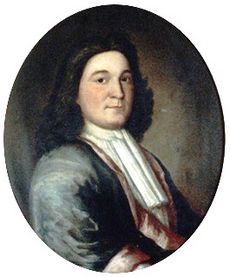
Dudley's main goal was to get Sir William Phips removed as Massachusetts governor. He didn't hide this from the colony's agents. Phips's rule was unpopular in Massachusetts, and he was called back to England to answer various complaints. Dudley had Phips arrested shortly after he arrived, claiming Phips had kept customs money from the King. Phips died in February 1695 before the charges were heard. Dudley was hopeful he would be named the next governor.
However, Dudley's enemies from New York and Massachusetts worked together to stop him. Jacob Leisler's son was in London trying to clear his father's name and get his family's property back. A bill was introduced in Parliament to do this, with help from Massachusetts agent Constantine Phips. The debate included a review of Leisler's trial, and Dudley had to appear and defend his role in it. Afterward, Phips wrote that Dudley "is not so much talked of to be governor." The job went instead to Lord Bellomont.
Cutts continued to support Dudley. He helped Dudley get elected as a Member of Parliament for Newtown in 1701. This allowed Dudley to make more political connections in London. He even managed to temporarily fix his relationships with Constantine Phips and Cotton Mather. After Bellomont died in 1701, Dudley began pushing to become the governor of Massachusetts. He succeeded, receiving appointments as governor of Massachusetts and New Hampshire on April 1, 1702, from Queen Anne.
Governor of Massachusetts and New Hampshire
Dudley served as governor until 1715. His time in office was often marked by conflicts with the local government, especially in the early years. The English government told him to get a steady salary for the governor from the colony. However, he and all future royal governors failed to get this from the local government. This became a constant source of tension between the King's representatives and the colony.
Dudley complained about this in letters to London. He wrote about people "who love not the Crown and Government of England to any manner of obedience." In one letter to his son Paul, who was the colony's attorney general, he wrote, "this country will never be worth living in for lawyers and gentlemen, till the charter is taken away." This letter was found and published, which made people in the colony even more against his rule.
Dudley also angered the powerful Mather family when he chose John Leverett to be the president of Harvard instead of Cotton Mather. He often blocked the election of councilors and speakers of the local government who had acted against him in 1689. This made him even more unpopular in Massachusetts. In contrast, his time as Governor of New Hampshire was well-liked. Its local government even praised him to the Queen after hearing complaints from his Massachusetts opponents.
Queen Anne's War
Dudley actively managed the colonies' defenses during Queen Anne's War. He tried to prevent Native American attacks organized by the French. He met with Native American leaders at Casco Bay in June 1703. However, the French had already gathered support, and the war began with raids on southern Maine settlements in August 1703.
Dudley called out the local army and allowed private ships to attack French shipping. He also strengthened the borders of Massachusetts and New Hampshire from the Connecticut River to southern Maine. The French and Native Americans attacked Deerfield in February 1704. This led to calls for revenge, and Dudley authorized the experienced Native American fighter Benjamin Church to lead an expedition against settlements in Acadia. Dudley also spent a long time negotiating for the return of people captured at Deerfield.
Merchants in Boston and the Mather family accused Dudley of working with smugglers who were illegally trading with the French. This was partly because he specifically refused permission for Church to attack the French city of Port Royal. To stop these criticisms, he sent the colonial army on an unsuccessful mission against Port Royal in 1707. In 1708, a harsh attack on his leadership was published in London. It was called The Deplorable State of New England by reason of a Covetous and Treacherous Governor and Pusillanimous Counsellors. This was part of a plan to get him removed from office.
Dudley again gathered the local armies for a planned mission against Quebec in 1709. However, the supporting mission from England was canceled. Help arrived from England in 1710, and a successful siege led to the fall of Port Royal. This marked the beginning of the Province of Nova Scotia.
Boston was again the starting point for the 1711 Quebec Expedition, which combined British and colonial forces. However, the mission failed badly when some of its ships crashed on the shores of the Saint Lawrence River. During the war, Dudley also allowed missions against the Abenakis in northern New England, but these were mostly ineffective. The war became quieter after Port Royal fell, with only small raiding parties attacking frontier communities. Peace came in 1713 with the Treaty of Utrecht.
Dudley negotiated a separate peace with the Abenakis at Portsmouth, New Hampshire in 1713. He wanted to separate the western Kennebec tribe from French influence. He took a firm stance, threatening to stop trade that was vital for their survival. He also repeated claims that the British had control over them. The Treaty of Portsmouth (1713) came from these talks and repeated the claims of British control. Dudley claimed that the French had given up Abenaki lands as part of Acadia. One Native American leader responded, "The French never said anything to us about it, and we wonder how they would give it away without asking us." Despite this, Dudley and later governors treated the Abenaki as British subjects. Disagreements continued over British colonial expansion into Maine, which led to Dummer's War in the 1720s.
Other Challenges
The war made money problems worse in Massachusetts. The colony had been printing paper money since the 1690s. Printing large amounts of this money caused its value to drop compared to precious metals used in other currencies. This situation caused a disagreement between the colonists and the governor that lasted until the 1760s. Business leaders who borrowed money were happy to pay it back later with money that was worth less. Lenders, however, wanted changes to make the money stable.
In 1714, Dudley's opponents suggested that a bank should print as much as £50,000 in currency. This money would be backed by the shareholders' real estate. Dudley was against this plan. Instead, he convinced the local government to issue £50,000 in bills of credit. The powerful financial groups he angered with this decision eventually led to his downfall.
In 1713, surveys showed that the border between Massachusetts and the Connecticut Colony had been drawn incorrectly in the 1600s. This meant Massachusetts had given out land that actually belonged to Connecticut. Dudley and Connecticut Governor Gurdon Saltonstall made an agreement. Massachusetts would keep those lands but would give Connecticut an equal amount of land. These Equivalent Lands were over 100,000 acres (400 km²) on both sides of the Connecticut River in northern Massachusetts, southeastern Vermont, and southwestern New Hampshire. These lands were sold in April 1716, and Connecticut used the money to fund Yale College.
Dudley's term as governor ended in 1714, six months after Queen Anne died. The governor's council was controlled by his political opponents, and they took charge of the government. They assumed control on February 14, 1715. Just six weeks later, news arrived from England that King George I had temporarily confirmed Dudley's appointment. He was reinstated on March 21.
However, Dudley's political opponents were active in London, especially those involved in the land bank idea. They convinced King George I to appoint Colonel Elizeus Burges as governor later that year. Burges's appointment was announced in Boston on November 9, 1715, ending Dudley's time as governor. Burges was not in the colony, so the government fell to Lieutenant Governor William Tailer, whose appointment had been renewed.
Jonathan Belcher and Jeremiah Dummer (the brother of Dudley's son-in-law William Dummer) bribed Burges to resign his position without leaving England in April 1716. A new appointment was given to Samuel Shute, who promised to oppose attempts to create the land bank. Shute arrived in the colony and became governor in October 1716, with William Dummer as his lieutenant.
Dudley retired to his family home in Roxbury. He acted as an informal advisor to Governor Shute when he arrived. He also appeared at public and private events. Joseph Dudley died in Roxbury on April 2, 1720. He was buried next to his father in Roxbury's Eliot Burying Ground, with a ceremony fitting his important position.
Family and Legacy
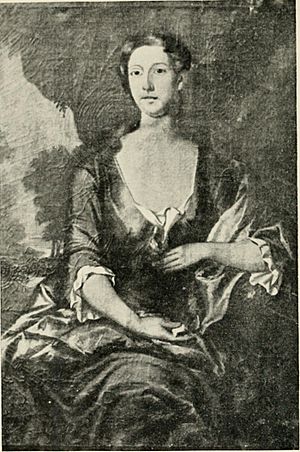
In 1668, Dudley married Rebecca Tyng, who passed away two years after him. They had 12 children, and 10 of them lived to adulthood. His son Paul became the attorney general and chief justice of Massachusetts. The town of Dudley, Massachusetts is named after his sons Paul and William, who were its first landowners. His daughter Katherine Dudley married Lt. Governor William Dummer. Another daughter, Ann Dudley, married John Winthrop (1681–1747), who was the son of Wait Winthrop and grandson of John Winthrop the Younger. John Winthrop the Younger was the great-grandson of John Winthrop, who was a governor of the Massachusetts Bay Colony. John Winthrop and Ann Dudley were the parents of Catherine Winthrop, who married Colonel Epes Sargent. They were the parents of Paul Dudley Sargent (1745-1828).
When he died, Dudley owned large areas of land in Massachusetts, mainly in Roxbury and Worcester County. He bought the Worcester properties from the Nipmuc people with his partner William Stoughton. He was also given land in Oxford, Massachusetts to help French Huguenots settle there. He often used his position to make sure his land ownership papers were legally clear. This was especially true when he was president of the Dominion and governor of the province. This practice also helped his friends, relatives, and business partners. Edward Randolph wrote that it was "impossible to bring titles of land to trial before them where his Majesties's rights are concerned, the Judges also being parties."
Historian John Palfrey wrote that Dudley "united rich intellectual attributes with a groveling soul." This means he was very smart but also very focused on his own gain. He used his good family connections to the Puritan leaders of Massachusetts to build relationships in England. However, he then went against those Massachusetts connections when it helped him gain more power. Thomas Hutchinson, who also served as a provincial governor and wrote a detailed history of Massachusetts, said that Dudley "had as many virtues as can consist with so great a thirst for honour and power." Biographer Everett Kimball added that Dudley "possessed a good deal of tact and personal charm, by which, when everything else failed, he could sometimes transform an enemy into a friend."
Images for kids
 | Precious Adams |
 | Lauren Anderson |
 | Janet Collins |


